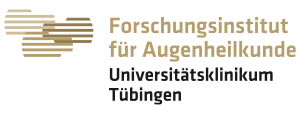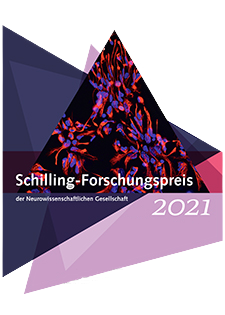How we see the world depends on what information our eyes send to the brain. Already within the eye – the first processing stage of the visual system – the retina breaks the incoming visual signal into parallel image representations that inform the brain about important aspects of the environment such as contrast, motion or color. However, the full extent of visual information the eye sends to the brain has remained largely unresolved.
Katrin Franke receives the Schilling Award of the German Neuroscience Society 2021 for her work on functionally characterizing retinal information channels and investigating how they evolve across the retinal network. By combining large-scale functional imaging with machine learning, her work revealed that the eye sends a much more complex and processed signal to the brain than previously thought and demonstrated how inhibitory circuits are key in generating this functional diversity. More recently, her research focuses on the question how single visual features like color evolve across the first processing stages of the mouse visual system. Together, her work on retinal function has contributed to an increasingly coherent picture of how the retina processes the visual input to extract relevant aspects from the environment. Such a detailed understanding of healthy retinal function is key for identifying circuit mechanisms underlying functional deficits present in diverse retinal degenerative diseases, thereby guiding the development of new treatment strategies to restore physiological function in the diseased system.
Katrin Franke received her PhD at the International Max Planck Research School for Neural and Behavioral Sciences at the Graduate Training Center Tübingen. Since then, she has been Junior Research Group Leader at the Bernstein Center for Computational Neuroscience and the Institute for Ophthalmic Research at Tübingen University, with some extended research periods at Baylor College of Medicine in Houston, US.
About the German Neuroscience Society (GNS)
The GNS currently has more than 2,300 members. We represent basic neuroscientists investigating the development, function, abilities and pathology of the brain and nervous system. The GNS is a non-profit organization without financial objectives.
Aims, goals and objectives
The GNS is committed to the advancement of neuroscience research and education. We represent all aspects and all subfields of neuroscience within Germany and abroad. - Read more
Partner organizations
The GNS collaborates with partner organizations in Germany and abroad to achieve the goals defined in its statutes. - Read more
Commercial partners
The GNS collaborates with German and foreign companies, providing products and solutions for neuroscience research. The Göttingen meetings offer exhibit space for these commercial partners.- Read more
History
In 1993, at the Charlottenburg district court of Berlin, and after a two year founding period full of constructive and sometimes controversial discussions, the Neurowissenschaftliche Gesellschaft e. V. (NWG) / German Neuroscience Society (GNS) was registered as a non-profit organization. - Read more





